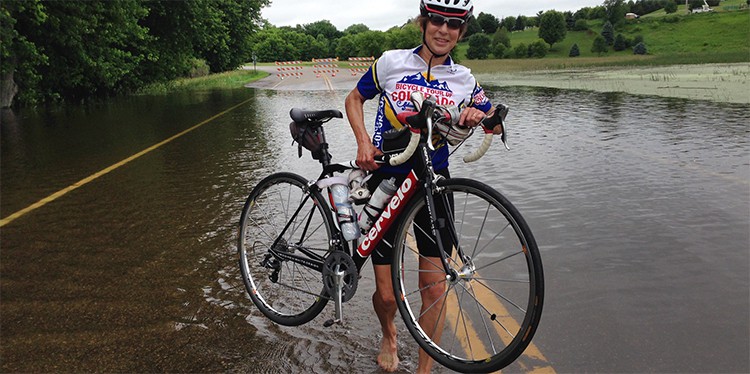Family, friends of 9-time Ironman Triathlete hold fundraiser to support brain injury research

 Charlene Barron was born in Chicago where she trained as a nurse, riding her bike to school even through snowy winters. While she was still young, her mother developed breast cancer. Inspired by her mother’s care, Charlene subsequently took a position at St. Mary’s Hospital in Rochester, where she met her husband, orthopedic surgeon Dr. Steve Barron, on a blind date. They would be married for 41 years and raise three children – and multiple dogs – together in Medina. Their son Adam died tragically at the age of 29 while kayaking in Colorado.
Charlene Barron was born in Chicago where she trained as a nurse, riding her bike to school even through snowy winters. While she was still young, her mother developed breast cancer. Inspired by her mother’s care, Charlene subsequently took a position at St. Mary’s Hospital in Rochester, where she met her husband, orthopedic surgeon Dr. Steve Barron, on a blind date. They would be married for 41 years and raise three children – and multiple dogs – together in Medina. Their son Adam died tragically at the age of 29 while kayaking in Colorado.
Charlene had long been a dedicated runner, biker, and swimmer who would eventually run more than 40 marathons. Twenty of these were the Twin Cities Marathon and 8 were in Boston. The year the bomb went off in Boston she was only 100 yards from the finish at the time of the explosion; her time was 4:08. Charlene also completed 9 Ironman Triathlons, including the World Championship Ironman Triathlon in Hawaii at age 60, and skied 30 American Birkebeiners in Hayward, WI.
On the morning of Aug 17, 2016, Charlene was riding with her friend and training partner Sarah Goullaud. “It was a beautiful sunny morning and the biking conditions were exceptional,” said Sarah. “We started our bike ride at 8:30 am heading south into the wind. We planned on riding 20-25 miles. Charlene was in front of me until we got to the intersection where I went in front of her. We turned right onto a lovely road. The only thing unusual was that she usually rode in front of me – but I knew she would catch up with me soon.”
“The next thing I heard was metal on the pavement. When I looked back Charlene was not moving, in the middle of the road, unresponsive, feet still clipped into her pedals. As I went running towards her yelling, my first concern was that a car would come along and hit her.”
Charlene was taken to Hennepin County Medical Center where she was diagnosed with a severe traumatic brain injury, shoulder fracture, four rib fractures, a lung contusion, and pelvic, sacrum, and spine fractures. She was taken straight from the stabilization room to the operating room where she underwent immediate surgery to relieve pressure and bleeding on both sides of her brain. This was the first of what would ultimately be five neurosurgical operations to try and restore neurologic function. Despite best efforts, Charlene ultimately died from complications related to her brain injury.
Charlene’s friends and family have chosen to honor her memory and relentless spirit by holding a fundraiser to support brain injury prevention. “She was one of the strongest women I knew, both emotionally and physically,” said her husband Steve. When their son Adam died in 2006, “she held our family together and she inspired all of us by her energy and resilience throughout her life.”
“Because Charlene loved her dogs, and they were her constant running companions for many years, we decided to hold a dog run at Baker Park, where she trained for many years,” said Steve.
The dog run occurred on Sunday, September 10, 2017, with registration at 8:00 and a 9:00 AM start time.
The fundraiser supports research investigating whether neck strengthening can contribute to decreased incidence, severity, and duration of concussion symptoms in 1,500 youth athletes recruited at seven Minneapolis/St Paul area schools. The research is being conducted by Dr. Uzma Samadani and colleagues from Hennepin County Medical Center’s Brain Injury Research Lab.
“We are honored to be the benefactor of this fundraiser inspired by the memory of such a tremendous role model,” said Dr. Samadani. “We hope that our work will reflect favorably on her legacy. She clearly was a woman who understood the risk/benefit of sports and we hope that our research will lead to an improved understanding of how to decrease the risk of brain injury associated with sports benefiting future generations of athletes.”

